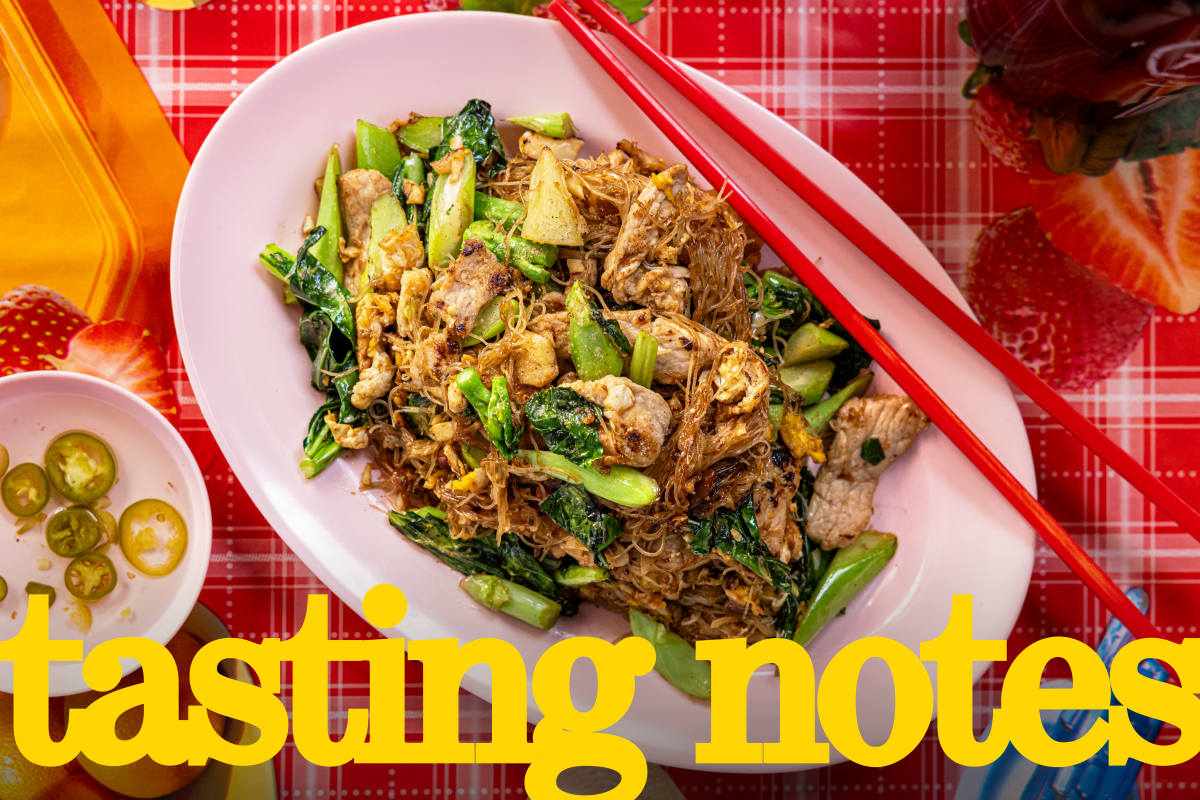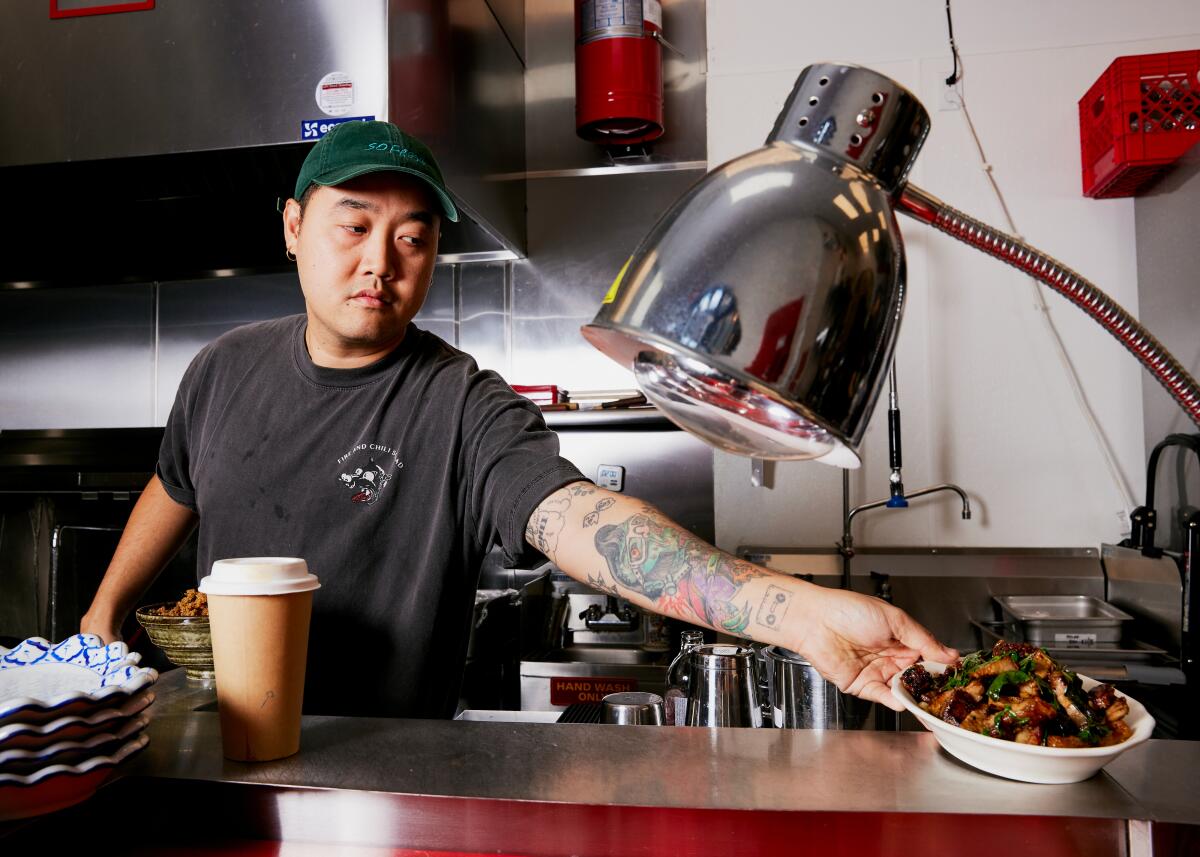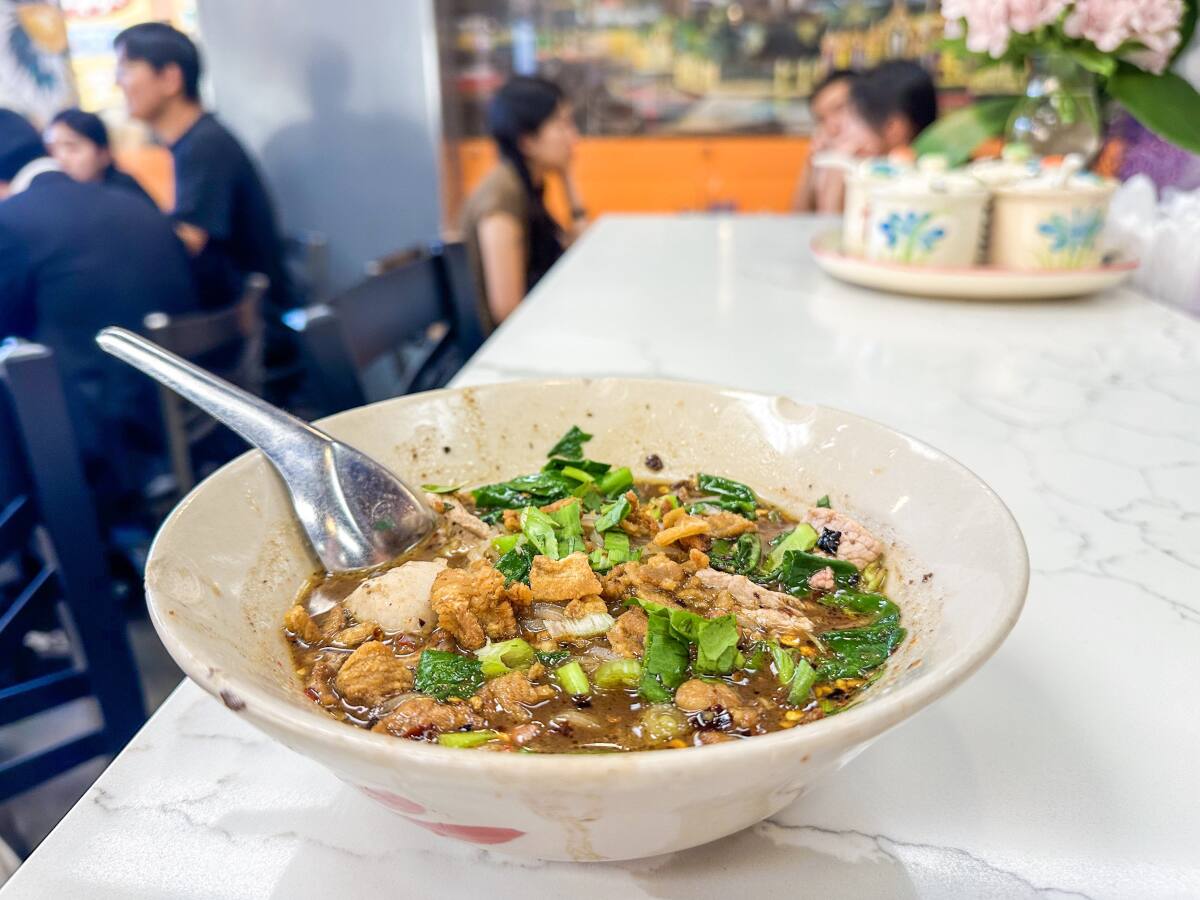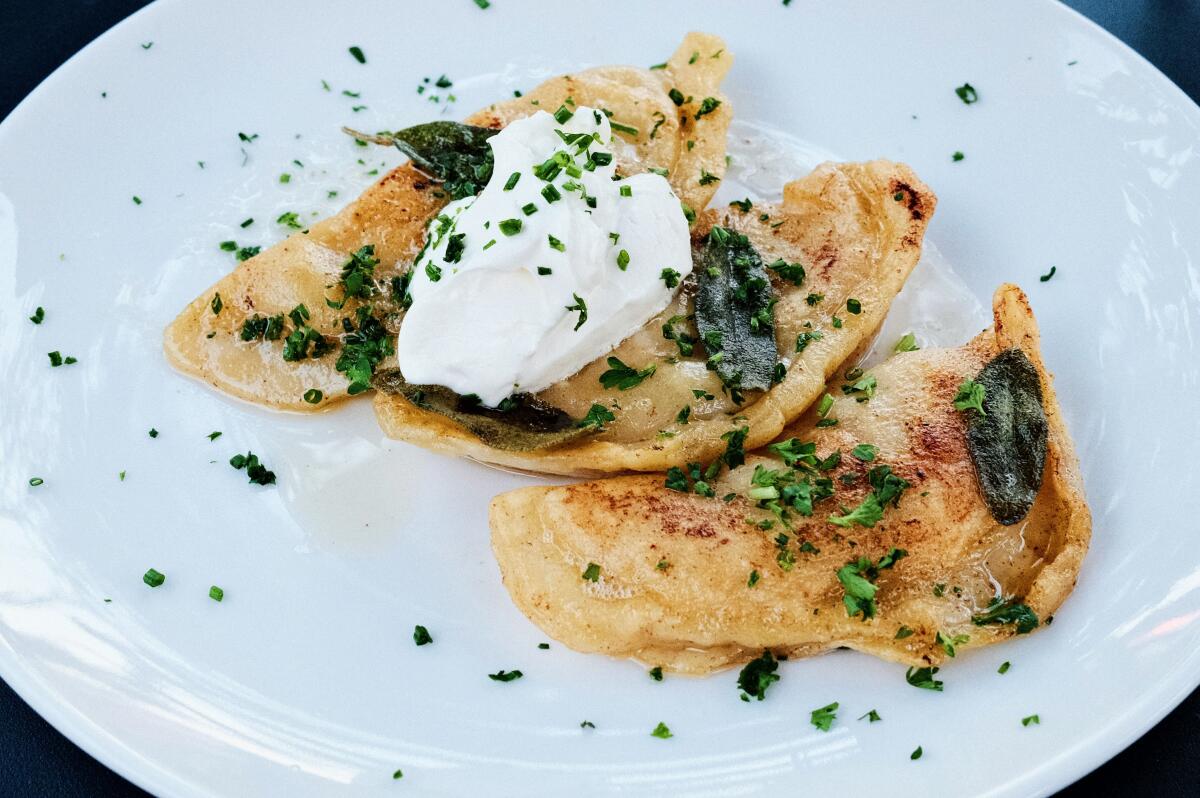This is L.A.’s next great place to slurp Thai boat noodles

- Share via
Thinking about Thai noodle dishes in Los Angeles feels like climbing one of Escher’s impossible staircases while playing an endless game of connect-the-dots. One bowl leads to another, ad infinitum.
The best noodle for Holy Basil’s pad see ew
For this week’s review, I wrote about Wedchayan “Deau” Arpapornnopparat and Tongkamal “Joy” Yuon’s second location of Holy Basil, ensconced between two buildings along Glendale Boulevard in Atwater Village. Look for the row of always-filled tables covered in red, checkered oil cloth.
I most admire the experimental direction in which Arpapornnopparat takes his cooking, which fundamentally looks to Bangkok-style street foods for inspiration. Recently he’s been serving fried soft-shell crab and shrimp in a wild, shooting star of a sauce that incorporates salted egg yolk, shrimp paste, shrimp oil, scallion oil and cooking wine.
The Atwater Village menu is always changing and currently lists a lone noodle dish: wok-fried pad see ew made with vermicelli, a nostalgic choice that Arpapornnopparat loved when he was growing up. I liked the filigreed texture of the super-fine strands, but remembered being keener on the version using flat rice noodles at the original Holy Basil downtown. I returned there before settling down to write the review and, sure enough, the DTLA version was superior. The wide noodles better absorb the searing smokiness of the wok, tossed in a combination of soy sauce and XO sauce for umami bass notes and chopped Chinese broccoli tumbling through for its green crunch.

As I slurped away, my brain reeled off a roster of other superior Thai noodle dishes around the city. The khao soi at Northern Thai Food Club (also known as Amphai Northern Thai Food), which I like to spike with chile oil and lime juice to cut the richness of the coconut cream. The famous jade noodles at Sapp Coffee Shop, tangling pork and crab meat, and the strongly competing version on the menu at Luv2Eat two miles away. Anajak Thai’s silky-chewy drunken noodles. And for boat noodles …
Well, Pa Ord has been a standard-setter for the dish. Also known as kuay teow rua, the combination of deeply spiced broth, sweet-sour flavors and condiments like crisped pork rinds likely traces its origins to the community of Chinese laborers hired by Chulalongkorn (King Rama V) to dig the Rangsit canal through central Thailand in the 1890s. The waterway literally helped pave the way for the global city that Bangkok would become.
Then I remembered I hadn’t yet been to an L.A. newcomer for boat noodles: Mae Malai Thai House of Noodles in Hollywood.
A new destination for boat noodles
Malai Data began serving her version of boat noodles — a recipe gleaned from her mother-in-law, who’s made the dish professionally in Bangkok for decades — and other dishes from a stand in front of Silom Supermarket in Thai Town in early 2023. By year’s end she had a lease for a space two blocks away, in the shopping complex at Hollywood Boulevard and Western Avenue anchored by Ralph’s and Ross Dress for Less.
My first time in Mae Malai’s dining room, among its traffic-cone orange walls, I relied on old habits: I drag-raced through the menu. I crunched lovely, shattering egg rolls, a basil leaf wound carefully around the fillings of glass noodles and garlicky ground chicken. There were the traditional boat noodles, and a soy sauce-spackled dry version scattered with ground peanuts, and tom yum, herbal and limey, also in brothy and dry versions, and kanom tuay (tiny cups of steamed pandan-scented coconut milk custards set using tapioca) for dessert. The restaurant’s pad see ew nails the requisite twang and contrasts, though it lacked the smoky wok hei like the one at Holy Basil.
It was all roundly satisfying, but by the time I reached home I knew I should have pared down my choices to more thoughtfully concentrate on Data’s signature.

Two days later, I’m alone at Mae Malai’s counter, ordering one bowl of boat noodles, which costs $8.49. The servings are small, as is customary: In Bangkok part of the fun is going from stall to stall, tasting each cook’s individual style and tweaks. I ask for thin rice noodles among five options, as the server recommends, and pork over beef, and “spicy,” rather than “Thai spicy,” because I am past the phase where I tolerate my unacclimated system being obliterated by capsicums for the brief endorphin thrill-ride.
At this level, the chile heat races across the taste buds as a first sensation and then backs off, balancing with sweetness (rock sugar is a common ingredient) and a vinegary thwack. Spices like star anise and white pepper flicker in the background. Green onions and fried, battery crumbles of pork skin rustle and crunch against the teeth, and bites of the bowl’s single pork meatball bounce around the palate. The noodles feel squiggly, and they’re gone quickly, until I’m sipping only the broth, which is tingly and nearly the color of black coffee.
A splash of beef blood is a common thickening agent, and a staffer acknowledges its presence before shooing off my nosiness.
“I can’t tell you anything more,” she says. “Family secrets.”
No matter. I’m already convinced this is a stellar addition to L.A.’s constellation of Thai noodle dishes.
Mae Malai Thai House of Noodles, 5445 Hollywood Blvd., Los Angeles, (323) 652-2935, instagram.com/malai_noodles
Also ...
- Who can resist this Jenn Harris headline: “I’m melting. This cold, creamy tofu is the only thing I want to eat right now.” She’s talking about Morihiro Onadera’s handiwork at his standout restaurant that’s also located in Atwater Village.
- This week, Stephanie Breijo writes about the opening of Belle’s Bagels Delicatessan and Bar, the much-anticipated arrival of Bridgetown Roti and, to complete the week’s Atwater Village triumvirate, the new, very fun Bar Sinizki and its dinnertime pierogi.
 Bar Sinizki, from the teams behind Dune and Kaldi Coffee, specializes in Eastern European classics such as cheese-and-potato pierogi.(Stephanie Breijo / Los Angeles Times)
Bar Sinizki, from the teams behind Dune and Kaldi Coffee, specializes in Eastern European classics such as cheese-and-potato pierogi.(Stephanie Breijo / Los Angeles Times) - Danielle Dorsey has a fresh guide to West Adams, with plenty of restaurant recommendations.
- We compiled a list of 19 family-friendly dining options from the annual guide to 101 Best Restaurants in Los Angeles.
You’re reading Tasting Notes
Our L.A. Times restaurant experts share insights and off-the-cuff takes on where they’re eating right now.
You may occasionally receive promotional content from the Los Angeles Times.
Eat your way across L.A.
Get our weekly Tasting Notes newsletter for reviews, news and more.
You may occasionally receive promotional content from the Los Angeles Times.



